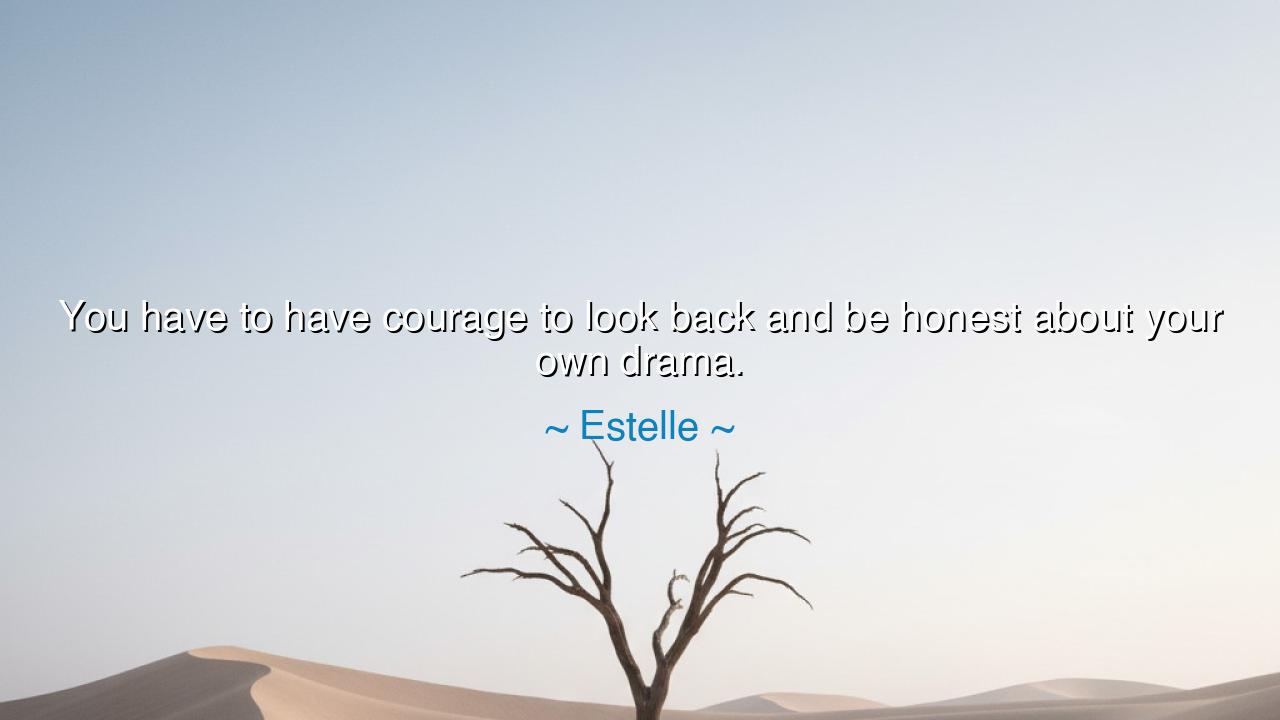
You have to have courage to look back and be honest about your






“You have to have courage to look back and be honest about your own drama.” — thus spoke Estelle, the singer and storyteller whose words echo with the wisdom of self-awareness and the strength of the human spirit. Her voice carries more than melody; it carries truth — that courage is not found only on the battlefield or in the face of danger, but also in the quiet moments when a soul turns inward to face itself. For it is far easier to confront the world than to confront one’s own past. To look back honestly, without denial or disguise, is to stand before the mirror of the spirit and see oneself clearly — the pain, the pride, the mistakes, and the lessons all woven together.
The origin of Estelle’s words lies in her journey as an artist and as a woman who rose from struggle to self-expression. She speaks from the understanding that the stories we tell ourselves — the dramas of our lives — can either enslave us or set us free. Many live haunted by their memories, rewriting their histories to soften the truth or burying what hurts too deeply to recall. But Estelle reminds us that healing and growth begin only when we dare to look backward without fear, when we hold our own story with both honesty and compassion. For to deny one’s past is to deny one’s becoming.
Courage, in this sense, is not the absence of fear, but the willingness to walk through it. The ancients said that “know thyself” was the highest commandment of wisdom, yet they knew how perilous that journey was. To know oneself truly requires peeling away illusion and pride, standing unguarded before the truth of one’s own actions and wounds. The brave are not those who have no pain, but those who face their pain with open eyes. When Estelle speaks of being “honest about your own drama,” she is calling for a return to the inner battlefield, where the enemy is not the world, but the falsehoods we cling to about ourselves.
Consider the story of Nelson Mandela, who, after twenty-seven years in prison, emerged not with bitterness but with clarity. In those long years of confinement, he was forced to look back — to examine not only what had been done to him, but what he himself had done, thought, and believed. He could have buried his pain beneath hatred, yet instead he met it with courage and truth. That honesty transformed him from a prisoner into a sage, from a victim into a leader of reconciliation. Like Estelle’s teaching, his example shows that self-honesty, however painful, is the path to inner liberation.
When one looks back honestly, one must face not only the wounds inflicted by others, but the wounds we have inflicted ourselves. It takes courage to admit that we have caused pain, to recognize the patterns that led us astray, to acknowledge the part we played in our own dramas. But in that act of humility, we reclaim our power. For as long as we hide from our truth, we are slaves to it; but once we face it, it loses its hold. This is the sacred paradox: that true strength is born of vulnerability, and true peace of confession.
Estelle’s words also carry a gentler wisdom — that honesty about the past is not meant for shame, but for freedom. The goal is not to dwell upon sorrow, but to transform it. When we look back with compassion, the jagged edges of memory begin to soften. The heartbreak that once ruled us becomes a teacher; the mistakes that once shamed us become stepping stones toward wisdom. This is the alchemy of the soul: to turn the lead of pain into the gold of understanding. But such alchemy begins only with honesty, and honesty demands courage.
Therefore, my children, take this lesson to heart: do not run from your story. The past cannot harm you once you have faced it with truth. Sit quietly with your memories. Ask yourself not, “What did they do to me?” but, “What did I learn? How have I grown?” Forgive others if you can, and forgive yourself even more. For the act of looking back is not to reopen old wounds, but to cleanse them, that you may move forward lighter, freer, and whole.
And remember this: the one who faces their own drama with honesty becomes unshakable. The storms of life may rage, but they will not move the one who has made peace with their own soul. As Estelle teaches, courage is not found only in the conquest of the world — it is found in the quiet bravery of looking back and saying, “This is who I was. This is who I am. And this is who I choose to become.”






AAdministratorAdministrator
Welcome, honored guests. Please leave a comment, we will respond soon